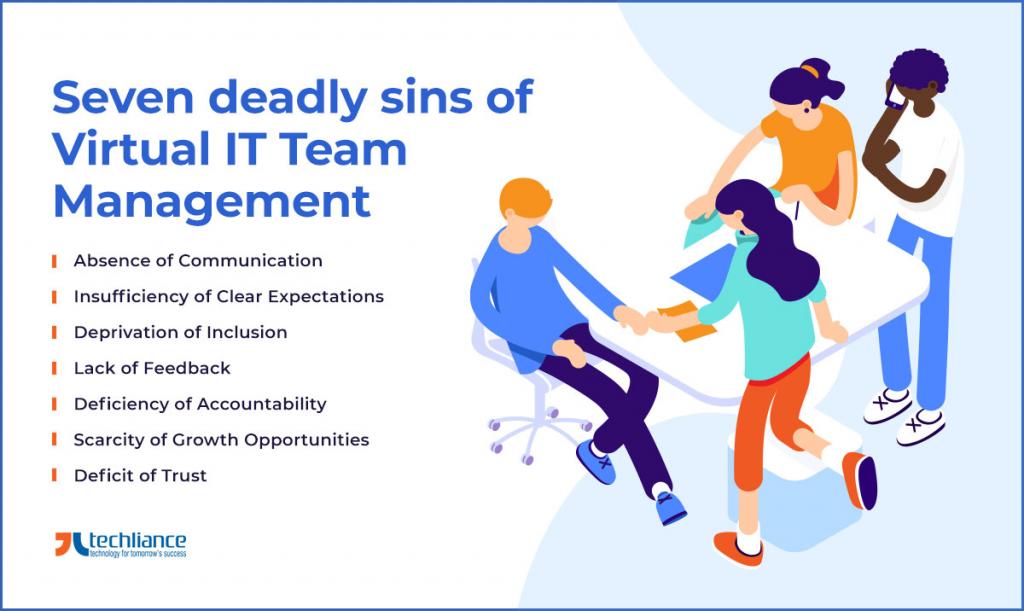Nowadays, working from home (WFM) or remote work has become main stream, especially in the technology vertical, with progressing world. In this article we discuss about seven deadly sins of virtual IT team management. We will also look into ways through which we can save ourselves from doing these mistakes.
This greatly improves telecommuting work culture, in turn playing role in business growth and company success.
Leadership studies guru Warren Bennis once declared that continuous learning makes you successful in management endeavor.
“Success in management requires learning as fast as the world is changing.”
Warren Bennis
As expectations are shifting in the business world, a good manager will be ready to prepare for it.
According to the employment trends by World Economic Forum (WEF), all forms of remote work (telecommuting, freelancing, online talent, and virtual teams etc.) are all on the rise.
WEF even labeled it “one of the biggest drivers of transformation of business models in many industries”.
In addition, there are many instances, a software development company while based in United States, also has overseas development office(s).
Thanks to COVID-19, teleworking or remote work for IT resources is becoming the way to go.
Let’s help you navigate these new waters, while you are beginning your journey for management of remote work.
Here is a list of the seven deadly sins of virtual IT team management to avoid in the decade of 2020.
- Absence of Communication
- Insufficiency of Clear Expectations
- Deprivation of Inclusion
- Lack of Feedback
- Deficiency of Accountability
- Scarcity of Growth Opportunities
- Deficit of Trust

We now elaborate these toxic evils in detail, that can undermine your supervision of remote IT resources, in 2024 and future.
Absence of Communication
The first sin that can right away drive your virtual IT team right into the ground is bad communication.
Remote teams only function with crystal clear communication guidelines, so you need to make sure these are well established.
Whenever new members join your team, have a strong on-boarding with a clear setup of how communication works in the company.
It will save you and team members from many misunderstandings.
This means answering questions such as the following.
Where is communication taking place?
What are the communication channels?
For example, take help of top collaboration tools and best productivity apps to improve performance.
Make use of Zoom for urgent matters or team meetings.
For reminders and small issues, utilize Slack.
Furthermore, Trello can assist you in project management and arranging due dates.
Insufficiency of Clear Expectations
Remote developers need to know what’s expected of them to deliver what you need.
Make sure that your instructions are clear and concise.
A strategy for this is to have regular video conferences with your team at least once a week.
Face to face meetings can be a huge benefit for successfully managing remote teams.
They allow you to connect better with your employees, and to understand each other better.
Leadership and management blog Lighthouse recommends asking your remote workers, “Is there anything you feel out the loop on?”.
It can trigger a good conversation with what they might feel they’re lacking and boost collaboration among them.
Deprivation of Inclusion
As stated by DigitalOcean’s research in which they surveyed 4,500 remote developers, 71% said they feel connected to their company’s community.
But there is still a 29% who feel excluded and not integrated into their company’s culture.
In essence, having remote employees who don’t feel part of a team, is a consequence of poor management.
There are plenty of virtual activities to bond and connect with your employees and make all of them feel part of a team.
Besides open communication, activities such as virtual coffee meetings, happy hours, or celebrating birthdays can go a long way.
Likewise, if your company can do so, planning a company retreat on occasion or an in-office get together, are highly beneficial.
Lack of Feedback
Reviews are critical for your employee’s job performance.
It is where they receive direction and feedback.
The same strategy should be applied to your remote worker.
True that you can’t physically sit down with them in your office.
It is important for you to still have those meetings with them, preferably via video chat.
A recommendation is to make two-way feedback meetings also.
This means telling them the aspects that you think they should improve.
In addition, recognize their contributions, and appreciate them if they have done a good job.
Moreover also ask them for their feedback about your managerial ability and company culture.
Remember that nobody is perfect ever.
Thus, it is good to know if you messed up in something.
Similarly, there can be some ways to improve the mode you manage your remote team.
Deficiency of Accountability
This is important to not let the mindset “out of sight, out of mind” rule the day, when it comes to managing your remote dev team.
As a good manager, plan on administering your remote workers.
But do not supervise them in a micromanagement kind of monitoring.
Have an idea of how things are progressing, and make sure that they are not overworking.
Since they generally don’t leave their working environment, consequently Remote workers are at risk of overworking most of time.
Encourage healthy working hours, scheduling, virtual water coolers, appropriate breaks, and overall a work/life balance.
Scarcity of Growth Opportunities
One of the major driving forces for most of employees is to climb the ladder of success.
It brings promotions, learning opportunities, knowledge empowerment and bonuses, etc.
But do you know, it is as important for your remote developers to understand, they have great opportunities for professional progress and skills improvement?
According to HackerRank 2019 Developers Skills Report in which they surveyed 71,000 developers from across 100 countries, both junior and senior-level developers prioritize professional growth and learning, when considering a job opportunity.
When you help your remote team grow and encourage them to be better, you will receive outstanding results and continued success.
Deficit of Trust
Throughout this article about seven deadly sins of virtual IT team management to avoid, we debate over the importance of communication, support, team spirit, accountability, and growth.
And at this point, you might be asking yourself, what’s left?
Consider the wise words of Stephen Richards Covey, famous American educator and author.
Trust is the glue of life. It’s the most essential ingredient in effective communication. It’s the foundational principle that holds all relationships.
Stephen Covey
Last of all, Lacking trust in your remote IT resources will cancel out avoiding all other sins of managing virtual IT team.
Why?
Because in the end, your fear that the job is not getting done will affect your entire treatment of your remote team members.
But, if you trust your remote employees, you will organically become a better remote manager for them.
Hence, you will be more inclined to communicate with them, include them, provide feedback etc.
Virtual IT Teams – Solution for Tech Workforce Shortfall
Many developed countries including United States are facing rising shortage of technology resources.
Migrating IT experts are essential to keep business operations running in USA, North America and Europe.
Pandemic lock-down, economic slowdown and interruption of Technology industry by Coronavirus, have severe effect on the availability of overseas IT talent worldwide.
So, telecommuting or remote work is increasingly becoming a solution, rather than the option, that it was beforehand.
With the idea of supervising remote IT resources closer to the horizon than ever before, a good captain always prepares to meet new challenges.
You prep the crew, raise the sails and tighten your grip, the helm ready to meet awaits.

Unlike in-office staff, you will be dealing with time zones, management software, and communication tools, to name a few.
It can appear like a daunting task, but it does not have to be that way.
Managers who start learning now how to run a virtual IT team, will be putting themselves in a unique position, in 2020’s decade.
One that’s moving with the current rather than fighting it.
Conclusion
Hiring an employee and trusting they’ll do a good job is already tough when you meet them in person.
But hiring a remote IT resource can turn out even dangerous.
Chances are that you can’t meet your candidates directly.
Therefore, you can consider a trial run to see if they are really a good fit for your company.
Make sure they understand your expectations and that they are able to communicate efficiently.

Are you looking for Virtual IT Team to run your business operations?
Talk with Techliance to know about talented offshore IT resources.
They can perform remote work for you on the basis of hourly, per project or dedicated resource.
Evaluate their tech expertise and come on-board with 7-day free trial now.




